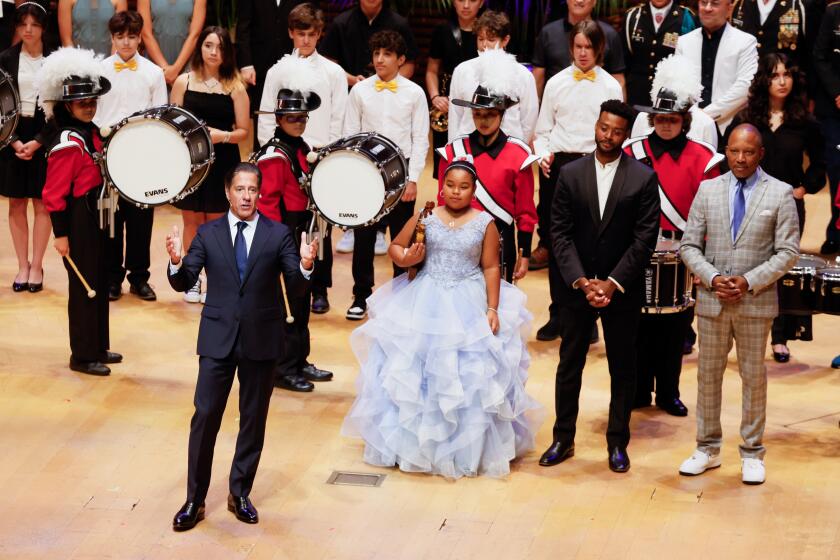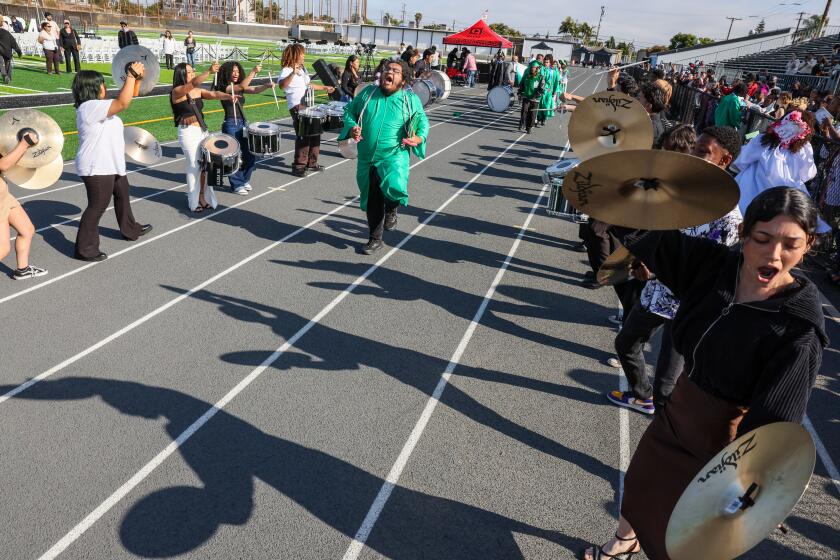Lone Black in Boalt Hall Class Urges Change
On an emotional first day of classes at UC Berkeley’s Boalt Hall School of Law, the lone black member of the 270-student incoming class revealed himself Monday to be a Bloomington, Ind., native who values diversity and was “surprised and disappointed” to learn of his solitary status.
At a news conference in a cavernous lecture hall, first-year student Eric Brooks, a 1992 graduate of Indiana University whose identity had been kept secret, walked through a swarm of photographers before taking the podium and reading a short statement.
“When choosing a law school, I placed a high value on the diversity of the student body and contemplated going to school elsewhere after learning the news,” Brooks said, his voice firm.
Brooks said he ultimately decided, however, that Boalt was where he would best be able “to effect change in our society and to fight for those things in which I believe.”
He vowed “to work to make needed changes and improvements for future students of color at Berkeley.”
Minutes later, in a courtyard outside, 200 students, faculty and graduates gathered for an “alumni speak-out” at which Boalt-trained lawyers rose one by one to condemn the University of California regents’ rollback of affirmative action--a ban that has resulted in sharp declines in the enrollment of blacks, Latinos and Native Americans at some UC professional schools.
Some alumni said they would withhold donations from UC, hire fewer Boalt graduates to join their firms and lobby legislators to repeal the regents’ 1995 decision.
“We need to send the message loud and clear that our dollars will not go to a university that does not value diversity among its students,” said Rene Saucedo, a 1990 graduate who is executive director of the Northern California Coalition for Immigrant Rights.
“I feel ashamed of this institution.”
Leo Brazil, a 1974 graduate who said he has his own law practice, wore a T-shirt that said, “Danger: Educated Black Man.” He exhorted the faculty and students to go on strike, saying, “You going to tell me you’re going to take our tax dollars and make this an elitist institution?”
The rally was an attempt, organizers said, to spotlight what was lost when the regents banned consideration of race and gender in graduate and professional school admissions. The same ban will go into effect for undergraduate admissions next year, so the professional school enrollment numbers have been closely monitored.
In June, UC officials revealed that not one of the 14 black students admitted to Boalt this year had decided to enroll. In addition to its one black student, Brooks--who had been admitted to the school last year but delayed starting--the entering class has 18 Latinos. There are no Native Americans. A year ago, the entering class included 20 black students, 28 Latinos and four Native Americans.
UCLA’s law school also reported a drastic drop in the number of “underrepresented minorities.”
Then, earlier this month, UC San Diego’s School of Medicine revealed that it had accepted not one of its 196 black applicants. According to preliminary tallies, the number of blacks, Latinos and Native Americans accepted at two other UC medical schools also dropped.
Opponents of affirmative action have said that the decrease in the number of blacks, Latinos and Native Americans who are being accepted and enrolling in UC’s professional schools this year is evidence of how large a factor race had become in admissions. Groups like the American Civil Rights Institute, which was co-founded this year by UC Regent Ward Connerly to promote the elimination of racial preferences, have rejected the idea that diversity is an essential part of a good education. They call instead for educators to work harder to make sure every student can compete.
But on Monday, speaker after speaker said Boalt will not be excellent unless it is diverse.
Lenard Weiss, a 1962 graduate, recalled that his class included just three women and two blacks. The partner in the San Francisco firm of Steefel Levitt & Weiss said diversity made economic as well as moral sense. “We must have a diverse body of lawyers serving our diverse clients,” Weiss said of his firm. “If we can’t get it from Boalt Hall, we’ll go elsewhere.”
Marjorie Shultz, a Boalt professor and 1976 graduate, said the quality of education would suffer. “What do lawyers do? Lawyers resolve conflicts . . . and monitor standards of conduct in this society, like justice, equity, fairness and reasonableness,” she said.
While Boalt’s new students are very accomplished, she said, “How can [they] be excellent collectively if [they] have experiences that are narrower than the experiences of this population?”
Shultz was one of many who stressed that all Boalt students will suffer from increasing homogeneity. With fewer points of view represented, intellectual debate will inevitably become less rigorous, they argued.
Herma Hill Kay, Boalt’s dean, did not participate in the rally Monday. But at the earlier news conference, she said she was worried about maintaining the quality of instruction. Without diversity, she said, “It is more difficult to have a classroom discussion. It’s like the old days, when we didn’t have any women. When we talked about alimony, it was only from the men’s point of view.”
Kay also shed more light on the 14 black students who rejected Boalt’s offer of admission. She acknowledged that the school had been slow to release their names to current black students, who had hoped to recruit them.
Because of the way the application was worded, Kay said, Boalt officials were advised that they could not lawfully release the students’ names. By the time this mix-up was resolved, all but three had chosen to attend law schools elsewhere: Four of the 14 went to Harvard, two to Stanford and two to Yale, Kay said.
Asked if she had intentionally been less aggressive to create a worst-case scenario, as Connerly has alleged, Kay was adamant.
“I categorically deny that I have attempted to sabotage the regents’ resolution,” she said.
But next year, she vowed, “we will do a better job of recruiting.”
More to Read
Sign up for Essential California
The most important California stories and recommendations in your inbox every morning.
You may occasionally receive promotional content from the Los Angeles Times.






